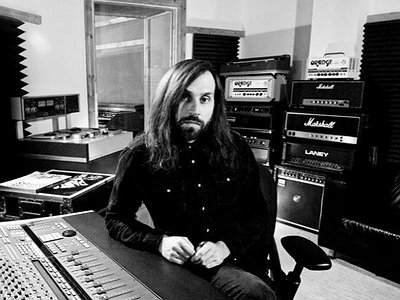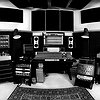Part 1
Name: Jaime Gomez Arellano
Nationality: Colombian
Occupation: Musician, Producer, Engineer
Selected Projects: Paradise Lost, Plan B, Hexvessel
Production/ Engineering Recommendations: It’s hard to pick just two, but I dare say my biggest inspirations so far in my career have been Andy Wallace and Steve Albini. Other producers/engineers I really love include Brendan O’Brien, Andrew Scheps, Rich Costey, Alan Parsons, Jimmy Page, Nick Raskulinecz, Joe Barresi and many others.
Website/ Contact: If you enjoyed this interview with Jaime Gomez Arellano, check out the Orgone Studios website.
What was your first recording-related job - and what or who were your early passions and influences?
I’m from a family of musicians in Colombia, so music has been an integral part of my life from day one. I was put in drum lessons at a very young age by my parents and discovered (and loved) rock music quite early too. My mother had some basic recording equipment at home, some entry-level microphones and a mixing desk. At the age of about 12, I started getting intrigued by all the lights, pots and buttons and started to play around with them. Eventually I found a way of connecting the output of the desk to a cassette deck and recorded my first “band” which consisted of myself on drums and two other friends on guitars and vocals. I still have that cassette around.
As for influences, the first band I got into was probably Queen. After that I discovered Iron Maiden through friends and I think that was the game changer for me – I’ve loved rock music since. Beyond that point, it was a combination of classic 70’s rock bands and heavy metal/thrash.
For most artists, originality is first preceded by a phase of learning and, often, emulating others. In which way is this also true for you? How would you describe your own development as a producer?
I think that’s true. I guess only once you really start to understand your intrument/tools is when you can start developing your own style. When I was teenager I remeber listening to “Heartwork“ by Carcass and being totally blown away by the production. I then started learning more about sound engineering and was leaning more and more towards that kind of style, but later on I started to really appreciate the production values and sound of classic albums such as Dark Side of the Moon by Pink Floyd, Physical Grafitti by Zep and Machine Head by Deep Purple. I think this really carved my style as I like using a combination of both old and new production styles techniques.
What were some of your main challenges and ambitions in terms of your approach to production when starting out – and how have they changed over time?
At first I really liked very clean and clear productions, and more “modern” sounding stuff. This was obviously very hard to achieve when I was learning, plus I had equipment limitations. When I seriously considered becoming a Producer/Engineer I was aiming for my records to sound that way. That was pretty hard to achieve because studios were mega expensive back then and no one had Youtube to go and learn in 5 minutes how to do it on your laptop. I soon got kind of bored of that sound and got much more into the sound of some American engineers/producers such as Steve Albini, Andy Wallace, Rich Costey, Joe Barresi etc. I found them a lot more interesting than the trigger happy, programmed drums, same super-distorted guitars the metal world was plagued with (and kind of still is). Things have changed over time and these days I appreciate much more other styles of production, including the really bad sounding ones! The main challenge for me personally is still to give bands their own sound.
How would you personally define your role in the creative process? Can you take me through your process on the basis of a production that's particularly dear to you, please?
This can vary from project to project. I normally tend to listen to the band first and meet them in person if possible to see if we all are aiming for the same thing. I also like watching the band play live or rehearsing so I can get an idea of how everyone’s playing their instruments and in some cases advise them on their playing, technique, etc. Next is to record some demos of the songs and work on the structures, start thinking about sounds, layers, textures, vocal melodies etc. When the songs are pretty much ready, we go in the studio and start recording.
Depending on the band, I may use several different drums, guitars, amplifiers etc. and go straight to analogue tape or digital recording depending on what I think suits best. Then is all about capturing the best performances from the artists and mixing/mastering, which are processes I tend to do at the same time. Most of the time I mix on an analogue desk using analogue gear and run the mixes through analogue tape. Communication with the artist throughout the process is key to achieve the desired result.
All of the above, as an example, is what I did last year with the band Hexvessel for their album “When We Are Death”.
In which way does the way music sounds change the way it is perceived? How do you see the relative importance of sound and composition?
I think the important thing is that they complement each other. For example, “Under a Funeral Moon” by Darkthrone wouldn’t be the same if it had been recorded with a really good sound. It has always been very important to me to give bands their own identity and sound, instead of just having “one sound” and making every band I work with sound the same.
What, to you, are the main goals of recording, editing and mastering?
As above, the important thing to me is to give bands a sound that suits them. The recording process is something I like to capture when the band are playing all together. I like to record to analogue tape and try to avoid click tracks, if the band/music lends itself to that. I record overdubs after that and really like changing it up when it comes to instruments instead of going for the same sounds throughout the record. Editing is something I do if it’s needed; depending on the style of the band I might even want to keep mistakes in if the take had “it”.
Recording can be related to a particular location, but thanks to technology, it no longer has to be. How do you see the relation between sound, location and space?
It’s funny you asked that as I’m currently in the process of moving out of London and relocating both myself and the studio to a farm in Bedfordshire. For a very long time I wanted to have a residential studio surrounded by nature and luckily, it’s happening this year. What I find with some bands when they come to my studio in London, sometimes they want to spend more time in the Crobar (rock bar in Soho) than at the studio. There are many distractions in the city. I’ve had the opportunity to record in some amazing residential studios in Europe and I find it to be a more enjoyable and inspiring experience.
Technology made recording more accessible which is a great thing as smaller bands can get chance to be heard. However, this has also caused the quality of production and sound to decrease overall, in my opinion. Although there are a lot of things you can do on a mere laptop these days to make a record, I think big studios with nice sounding rooms and great equipment are still essential to make great sounding records. A good atmosphere and environment helps heaps with this too.






